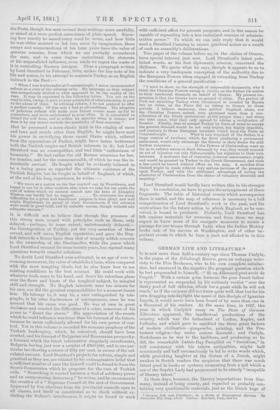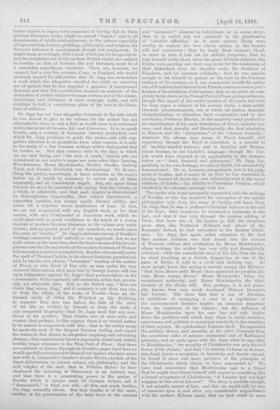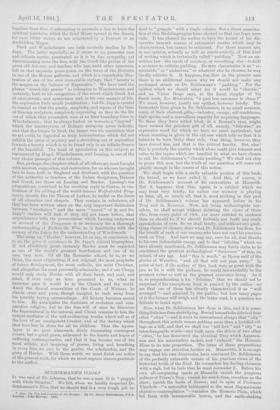GERMAN LIFE AND LITERATURE.*
IT is now more than half-a-century ago since Thomas Carlyle,. in the pages of the Edinburgh Review, gave an unhappy noto- riety to the Pere Bouhours, who to his own complete satisfac- tion, had answered in the negative the pregnant question which he had propouuded to himself,—" Si un Allemand pout avoir de. l'esprit." With a certain grim humour, the poor Jesuit father is represented as. suspended by his untimely verdict " over the dusky pool of full oblivion, which for a great while he will not reach," as if the reviewer did not know quite well, that but for his own dragging into daylight the name of this disciple of Ignatius Loyola, it would never have been heard of by more than one in a thousand of his readers. At the same time, in 1827, the year in which Carlyle's essay on The State of German Literature appeared, the intellectual productions of the country which was the fatherland of Luther, Kepler, and Leibnitz, and which gave to mankind the three great factors. of modern civilisation—gunpowder, printing, and the Pro- testant religion—lay under serious discredit ; and Carlyle, Scotchmau as he was to the backbone, and producing, as he did, the remarkable Latter-Day Pamphlet on "Jesuitism," in frill consistency with his inborn antipathies, might half consciously and half unconsciously be led to write words which, while provoking laughter at the dictum of a Jesuit, might awaken iu Scotch readers the suspicion that there was much latent good. in books or systems emanating from a soil which a son of the Scarlet Lady had pronounced to be utterly " incapable of literary talent." In these days, however, the literary importations from Ger- many, instead of being scanty, and regarded as probably con- taining very questionable materials, just as the Dutch kegs of Gorman Life and Literature ; in a Series of Biographical Sketches. Bs. Alexander Hay Japp, LL.D. Louden; Marshall, app, and Co.
butter landed in Japan were suspected of having hid in them perilous European books, might be named " legion ;" and in all departments of intellectual endeavour, in the spheres especially of high criticism, history, philology, philosophy, and religion, the Teutonic influence is omnipresent, though not omnipotent. It might seem, accordingly, that a book which has for its special ob- ject the enlightenment of the modern British reader on a subject so familiar as that of German life and literature, must be of a somewhat superfluous character. There are, however, wo (suspect, but a very few persons, if any, in England, who would seriously hazard the affirmation that Dr. Japp has undertaken a work which was altogether uncalled for, while we ourselves are of opinion that he has supplied a genuine, if unexpressed demand, and that this contribution towards an estimate of the characters of certain eminent German writers, and of the claims, tendencies, and influences of their writings, holds, and will continue to hold, a conspicuous place of its own in the litera- ture of criticism.
Dr. Japp has not been altogether fortunate in the title which lie was moved to give to his volume, for the author has not attempted to cover so vast a field as would seem to be embraced within the terms of German Life and Literature. It is, to speak loosely, only a century of Germanic literary production over which Dr. Japp professes to guide the reader, and with sug- gestive allusions to or quotations from other sources, it is only to the study of a few German authors within that period that he invites us. But that century ends in the days in which Ave are now living, and " the men of mark," indeed, who are introduced in our author's pages are none other than Lessiug, Winckelmann, Moses Mendelssohu, Herder, Goethe, Ludwig "Beck, and Novalis (Frederick von Hardenberg). To do any- thing like justice, accordingly, in these columns to the essays before us, it would be necessary to review each of them separately, and at considerable length. But, our space being limited, we must be contented with saying that the volume, as a whole, is admirable, and that each chapter is characterised by thoroughness, impartiality, fine critical discernment, a ,somewhat careless, but always manly literary ability, and above all, a supreme moral healthiness of tone. In fact, we are not acquainted with any English work, or for that matter, with any Continental or American work, which we could place with so much confidence in the hands of a young .student of modern German literature as the volume now under review ; and as special proof of our assertion, we would select „the essay on" Goethe." Dr. Japp's elaborate survey of Goethe's writings commends itself entirely to our approval ; but we are quite aware, at the same time,that the final outcome of his investi- gations into the life and works of the modern Solomon of Weimar will encounter a serious contradiction. Iteaders who are still under the spell of Thomas Carlyle, in his almost feminine, paradoxical, and, to use his own phrase, " hebetated," worship of the author of Faust, or who think of him only as seen under the very material illumination shed upon him by George Lewes, will rise up in indignation against Dr. Japp's final pronunciation on the ,consummate, while supremely, self-conscious, artist, but, person. ally, not admirable man. But, as the Scotch say, "facts are chiels that winna ding," and it certainly is not from any one, or from the whole, of the works of Goethe—from an un- biassed study of either his Wairrheit or his Diehtung, to separate thus into two halves the title of the story .of his life, as written by himself, or from the study of any competent biography—that Dr. Japp need fear any over- throw of his position. That Goethe was at once critic and creator, that perhaps, in this respect, there is no second author to be named in comparison with him ; that in his earlier songs he smote the rock of the deepest German feeling, and caused the waters to flow thence in altogether inspiring and refreshing .streams ; that romanticism found a supremely moral and, withal, terribly tragic utterance in the First Part of Faust ; that there are scattered or strewn throughout Goethe's pages (and here we would specially recommend to those of our readers who have never znet with it, Lancizolle's Goethe's (Metes Worte), crystals of the :finest deliverances on nature, science, art, philosophy, and the .still religton of the soul ; that in Wilhelm Meister he fore- shadowed the incoming of Democracy in an indirect way,
and that there is a penetrating power in the genius of 'Goethe which is unique amid all German writers, call it daemonisch," or what you will,—all this, and much besides, Dr. Japp naturally allows. But that Goethe is of the earth, earthy, is his presentation of the fatal force of the natural
and " daemonic " element in individuals, as in social story ; that he is naked and not ashamed in his glorification of "elective affinities," as if mere animal liking were worthy to replace the love which resides in the human will and conscience ; that ho freely drew women's blood, in order to turn it into ink for artistic purposes ; that he kept himself coldly aloof, when the great German patriots, like Fichte, were pouring. out their very souls for the awakening of their fatherland from its slumber under the thraldom of Napoleon, and for German solidarity ; that he was ignoble enough to let himself be patted on the back by the Corsican enslaver of his country, as if any commercial benefit his native city of Frankfort had derived from French commerce were a justi- fication of his adulation of the tyrant ; that, as an artist, he com- pletely broke down in the Second Part of Faust, giving us therein, though this sequel of the earlier portion of the poem had been for long years a subject of his serious study, a mere pallid, classical, phantasmagoria, out of which .all pathos, dramatic characterisation, or situation, have evaporated—and in this conclusion, Professor Blackie, in the masterly essay prefixed to his republication of his early translation of Faust, entirely con- curs—and that, morally and theologically, the final admission to Heaven and the " attractions " of the "eternal womanly," whatever the phrase may mean, of Faust himself, still impenitent, though the Devil is outwitted, is a scandal to all healthy-minded persons, and is fatalism and Roman- ticism become, to use Carlyle's language—though Mr. Car- lyle would have objected to its applicability in the instance before us—" dead, damned, and putrescent," Dr. Japp has, painfully to his own feelings, we cannot doubt, but successfully demonstrated. He is, however, scrupulously just in his judg- ment of Goethe, and it seems to us that he has succeeded in placing beyond all doubt the one redeeming trait in the social relations of Goethe,—his fidelity to Christiaue Vulpius, which resulted in his ultimate marriage with her.
The reader who is not personally acquainted with the writings of, Novalis, or who has acquired his conception of the mystic philosopher only from the essay of Carlyle, will learn from Dr. Japp that he was a profound Christian believer to the end of his days ; that, moreover, ho remained a Lutheran to the last ; and that it was only through the careless editing of Tieck, that from one of his hymns (p. 464) the suspicion arose that, like Frederick Schlegel and others of the Romantic School, he had submitted to the Roman' Obedi- ence. Dr. Japp has again called attention to the fact that modern Judaism was first drawn into the current of Western culture and civilisation by Moses Mendelssohn, whose writings the author has very ably and thoughtfully criticised ; while the remarkable story of his life, from the day he stood knocking as a Jewish beggar-boy at one of the gates of Berlin, is told in a vivid and striking way. As most people know, the saying is current among the Hebrews " that from Moses until Moses there appeared no prophet like unto Moses except Moses," Moses Maimonides being the exceptional authority, and Moses Mendelssohn the third revealer of the divine will. But, perhaps, it is not gener- ally known how very much developed Hebrew literature has become. The mere fact that a son of Abraham is ambitious of occupying a seat in a legislature of the uncircumcised Gentiles implies an immense departure from the traditions of his fathers ; but the influence of Moses Mendelssohn upon his race has not only broken down the partition-wall which kept them in social isolation, narrowness, and political or municipal inactivity in the oonutries of their sojourn. He spiritualised Judaism itself. He separated the sublime theism and morality of the older Covenant from the accretions alike of antique ceremonial and of Rabbinical pedantry, and we quite agree with Dr. Japp when he says that to Mendelssohn, " the morality of Christianity was only the full flower of the Judaic," and that " iu tracing Judaism to its foun-
tain-head, herein a revelation to humanity and herein eternal, he found it more and more inclusive of the principles of the Christianity which claims to have superseded it." We have read somewhere that Mendelssohn said to a friend that he might have found himself still nearer to something like a formal acceptance of Christianity, " if Lavater had not kept
nagging at him about his soul." The story is credible enough, if not actually matter of fact ; and this we would add, by way
of comment upon it, and after very considerable acquaintance with the modern Hebrew mind, that no task could be more hopeless than that of attempting to persuade a Jew to leave the spiritual fountains which the third Moses opened in the desert, for such bitter waters as are ministered by a Pearson or an Archbishop Magee.
Tieck and Winckelmann are both masterly studies by Dr. Japp. The latter especially, as it seems to us, possesses rare and delicate merits, penetrated as it is by fine sympathy, yet discriminating none the less, with the Greek-like genius of the great old Art-seer and teacher, who has, amid other treasures, left us that exquisite prose-poem ou the torso of the Hercules in one of the Roman galleries, and which is a remarkable illus- tration of one of his own memorable sayings, that "beauty is the tongue on the balance of Expression." We have used the phrase " Greek-like genius " as belonging to Winckelmann, and certainly, both in his recognition of the secret which Greek Art at once reveals and symbolises and in his own manner of life, the expression finds ample justification ; but Dr. Japp is careful to remind us that the purity, simplicity, and repose of the lines of Grecian sculpture, completely expressing as they do the life out of which they proceeded, were at no time boundary-lines to Winckelmann ; that he always looked on towards a " beyond " which the masterpieces of Hellenic antiquity never indicate, and that the longer he lived, the deeper was his conviction that no art could be regarded as truly humanitarian which did not exhibit the sense of mystery and a stretching-out of aspiration
towards a beauty which is to be found only in an infinite Source of the beautiful. The triad of speculation on this subject, as represented by Hegel, Winckelmann, and Lessiug, is one of the very choice passages of this volume.
But, perhaps, the chapters which of all others are most fraught with interest, suggestion, and instruction, for us who are brought face to face, both in England and Scotland, with the question of the authority or function of the Judaic Scriptures, Hebrew and Greek, are those on Leasing and Herder. Lessing's ton propositions, contained in his crushing reply to Goetze, in vin- dication of his editing of the world-famous Wolfenbilttel Frag- ments, should, like the Theses of Luther, be nailed on the doors of all churches and chapels. They contain, in substance, all that has been written since on the very important distinction between " revelation " and the mere " record " of it, and Dr.
Japp's readers will find, if they did not know before, that acquaintance with the persecutions which Lessing underwent on account of the Fragments is as necessary for a thorough understanding of .2Vathan the Trise, as is familiarity with the scenery of the Lakes for the understanding of Wordsworth.
The essay on " Herder," however, let us say, in conclusion, is, to us, the pice de resistance in Dr. Japp's critical biographies.
If not absolutely great, certainly Herder must be regarded as one of the world's greatest benefactors and one of its very best men. Of all the Romantic school, he is, as we think, the most originating, if not original, the most prophetic of future development, the most catholic, the most Christian, and altogether the most personally admirable ; and if our Clergy would only study Herder with all their heart, and soul, and mind, if even only as here presented to us, what an immense gain it would be to the Church and the world.
Amid the dismal seusualities of the Court of Weimar, he stands erect and pure, though tempted to rush away from his terribly trying surroundings. All history becomes sacred to him. He anticipates the doctrines of evolution and com- parative religion, but in the free-will of man ho discovers the fiupernatural in the natural, and Christ remains to him the unique mediator of the self-evidencing truths which tell us of the love of an omnipotent Creator, and of the destiny which that love has in store for all its children. That the Apoca- lypse is no poor almanack, dimly forecasting contingent events, but a great poem, addressed to the hearts and hopes of suffering contemporaries, and that it has become one of the most artistic and inspiring of poems, living and breathing in every line, we owe to the genius, the scholarship, and the piety of Herder. With these words we must finish our notice of the present work, for which we must express sincere gratitude to the author.




































 Previous page
Previous page